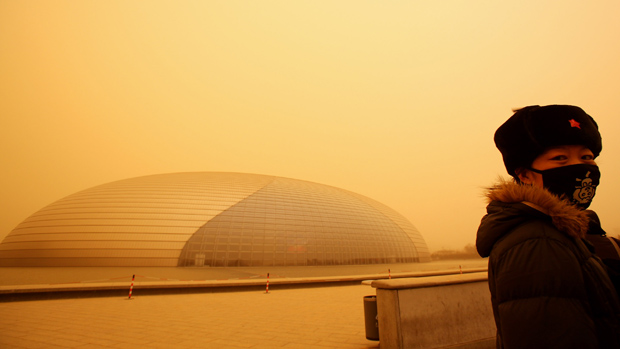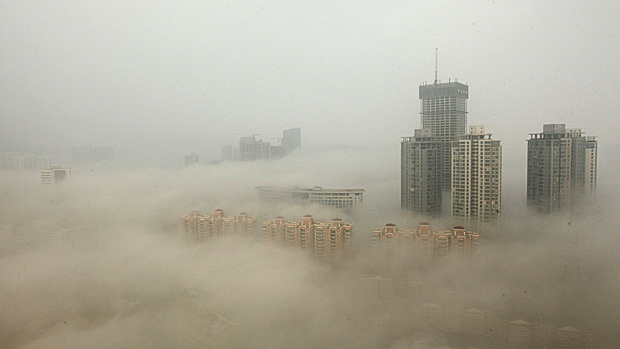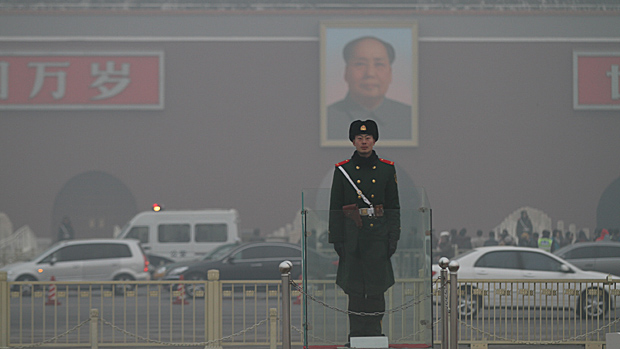Beijing air pollution like a 'nuclear winter', scientists say
Air pollution in Beijing is now 20 times worse than levels the World Health Organisation considers safe

A free daily email with the biggest news stories of the day – and the best features from TheWeek.com
You are now subscribed
Your newsletter sign-up was successful
TOXIC air pollution in China's capital city, Beijing, is now so bad it resembles nuclear winter, Chinese scientists have warned.
Pollution is even impeding photosynthesis in plants, something that could end up "wreaking havoc" on the country's food supply, The Guardian warns.
Six of the country's northern provinces have been covered with a layer of persistent smog for the past week. Experts predict that the pollution will not lift until Thursday.
The Week
Escape your echo chamber. Get the facts behind the news, plus analysis from multiple perspectives.

Sign up for The Week's Free Newsletters
From our morning news briefing to a weekly Good News Newsletter, get the best of The Week delivered directly to your inbox.
From our morning news briefing to a weekly Good News Newsletter, get the best of The Week delivered directly to your inbox.
In Beijing, concentration of PM2.5 particles – the tiny atoms that cause the air to appear hazy and produce adverse health effects when inhaled – rose to 505 micrograms per cubic metre on Tuesday night. The World Health Organisation (WHO) recommends a safe level of 25, the Guardian notes.

China's representative at the WHO admitted that current levels of PM2.5 particles constituted a "crisis".
Smog in northern China has closed schools and airports. Visibility in parts of Harbin, Heilongjiang province, was reduced to less than 50 metres last week, the BBC reports. All the province's highways were closed and airlines were grounded as thick pollution engulfed the region.
Almost 150 industrial companies have suspended operations until the smog lifts, but schools have remained open in spite of government regulations that prohibit students from attending class if pollution levels remain hazardous for more than three days in a row.
A free daily email with the biggest news stories of the day – and the best features from TheWeek.com

On Monday, the Forbidden City, one of Beijing's major tourist attractions had only 11,200 visitors – a quarter of the usual number during this time of year.
He Dongxian, an associate professor at China Agricultural University's College of Water Resources and Civil Engineering, said that if the current levels persist, Chinese agriculture will be exposed to conditions "somewhat similar to a nuclear winter".
The scientist warned that the smog could threaten the country's ability to grow crops. "Now almost every farm is caught in a smog panic," she said.
The warning follows a report from Shanghai Academy of Social Sciences earlier in the month that claimed Beijing's pollution made the city almost "uninhabitable for human beings," the South China Morning Post reports.
-
 How the FCC’s ‘equal time’ rule works
How the FCC’s ‘equal time’ rule worksIn the Spotlight The law is at the heart of the Colbert-CBS conflict
-
 What is the endgame in the DHS shutdown?
What is the endgame in the DHS shutdown?Today’s Big Question Democrats want to rein in ICE’s immigration crackdown
-
 ‘Poor time management isn’t just an inconvenience’
‘Poor time management isn’t just an inconvenience’Instant Opinion Opinion, comment and editorials of the day
-
 Epstein files topple law CEO, roil UK government
Epstein files topple law CEO, roil UK governmentSpeed Read Peter Mandelson, Britain’s former ambassador to the US, is caught up in the scandal
-
 Iran and US prepare to meet after skirmishes
Iran and US prepare to meet after skirmishesSpeed Read The incident comes amid heightened tensions in the Middle East
-
 Israel retrieves final hostage’s body from Gaza
Israel retrieves final hostage’s body from GazaSpeed Read The 24-year-old police officer was killed during the initial Hamas attack
-
 China’s Xi targets top general in growing purge
China’s Xi targets top general in growing purgeSpeed Read Zhang Youxia is being investigated over ‘grave violations’ of the law
-
 Panama and Canada are negotiating over a crucial copper mine
Panama and Canada are negotiating over a crucial copper mineIn the Spotlight Panama is set to make a final decision on the mine this summer
-
 Why Greenland’s natural resources are nearly impossible to mine
Why Greenland’s natural resources are nearly impossible to mineThe Explainer The country’s natural landscape makes the task extremely difficult
-
 Iran cuts internet as protests escalate
Iran cuts internet as protests escalateSpeed Reada Government buildings across the country have been set on fire
-
 US nabs ‘shadow’ tanker claimed by Russia
US nabs ‘shadow’ tanker claimed by RussiaSpeed Read The ship was one of two vessels seized by the US military